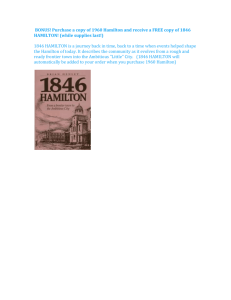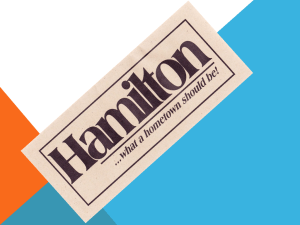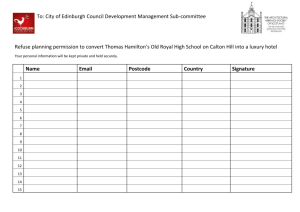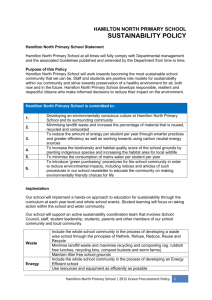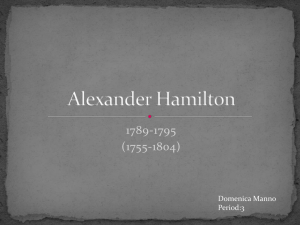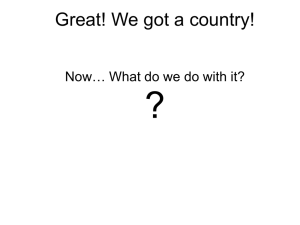Block Outcomes
advertisement
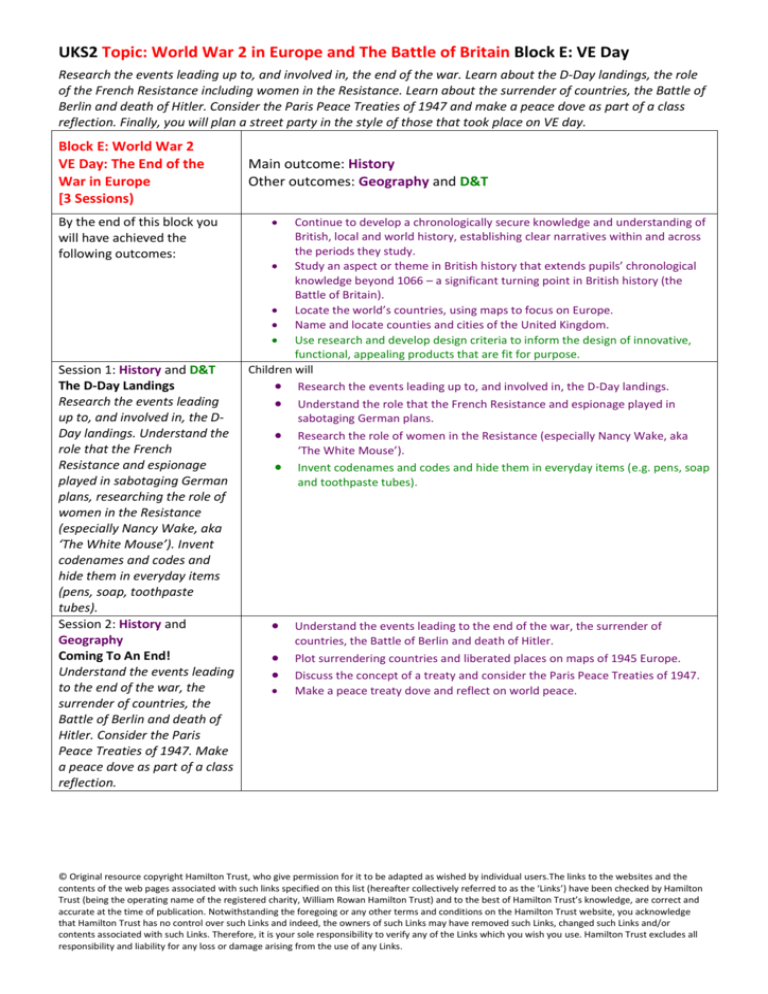
UKS2 Topic: World War 2 in Europe and The Battle of Britain Block E: VE Day Research the events leading up to, and involved in, the end of the war. Learn about the D-Day landings, the role of the French Resistance including women in the Resistance. Learn about the surrender of countries, the Battle of Berlin and death of Hitler. Consider the Paris Peace Treaties of 1947 and make a peace dove as part of a class reflection. Finally, you will plan a street party in the style of those that took place on VE day. Block E: World War 2 VE Day: The End of the War in Europe [3 Sessions) By the end of this block you will have achieved the following outcomes: Session 1: History and D&T The D-Day Landings Research the events leading up to, and involved in, the DDay landings. Understand the role that the French Resistance and espionage played in sabotaging German plans, researching the role of women in the Resistance (especially Nancy Wake, aka ‘The White Mouse’). Invent codenames and codes and hide them in everyday items (pens, soap, toothpaste tubes). Session 2: History and Geography Coming To An End! Understand the events leading to the end of the war, the surrender of countries, the Battle of Berlin and death of Hitler. Consider the Paris Peace Treaties of 1947. Make a peace dove as part of a class reflection. Main outcome: History Other outcomes: Geography and D&T Continue to develop a chronologically secure knowledge and understanding of British, local and world history, establishing clear narratives within and across the periods they study. Study an aspect or theme in British history that extends pupils’ chronological knowledge beyond 1066 – a significant turning point in British history (the Battle of Britain). Locate the world’s countries, using maps to focus on Europe. Name and locate counties and cities of the United Kingdom. Use research and develop design criteria to inform the design of innovative, functional, appealing products that are fit for purpose. Children will Research the events leading up to, and involved in, the D-Day landings. Understand the role that the French Resistance and espionage played in sabotaging German plans. Research the role of women in the Resistance (especially Nancy Wake, aka ‘The White Mouse’). Invent codenames and codes and hide them in everyday items (e.g. pens, soap and toothpaste tubes). Understand the events leading to the end of the war, the surrender of countries, the Battle of Berlin and death of Hitler. Plot surrendering countries and liberated places on maps of 1945 Europe. Discuss the concept of a treaty and consider the Paris Peace Treaties of 1947. Make a peace treaty dove and reflect on world peace. © Original resource copyright Hamilton Trust, who give permission for it to be adapted as wished by individual users.The links to the websites and the contents of the web pages associated with such links specified on this list (hereafter collectively referred to as the ‘Links’) have been checked by Hamilton Trust (being the operating name of the registered charity, William Rowan Hamilton Trust) and to the best of Hamilton Trust’s knowledge, are correct and accurate at the time of publication. Notwithstanding the foregoing or any other terms and conditions on the Hamilton Trust website, you acknowledge that Hamilton Trust has no control over such Links and indeed, the owners of such Links may have removed such Links, changed such Links and/or contents associated with such Links. Therefore, it is your sole responsibility to verify any of the Links which you wish you use. Hamilton Trust excludes all responsibility and liability for any loss or damage arising from the use of any Links. UKS2 Topic: World War 2 in Europe and The Battle of Britain Block E: VE Day Session 3: History Street Party! Plan a street party in the style of those that took place on VE Day, using bunting, food from 1940s recipes, music and tea dancing. Invite older members of the community to join in. Explore the excitement felt by those in British homes and streets when the end of the war was announced. Plan a street party in the style of those organized for VE Day, using bunting, music and tea dancing. Prepare food for the street party by cooking from 1940s recipes. Invite older members of the community to join in with the celebrations at a street party. © Original resource copyright Hamilton Trust, who give permission for it to be adapted as wished by individual users.The links to the websites and the contents of the web pages associated with such links specified on this list (hereafter collectively referred to as the ‘Links’) have been checked by Hamilton Trust (being the operating name of the registered charity, William Rowan Hamilton Trust) and to the best of Hamilton Trust’s knowledge, are correct and accurate at the time of publication. Notwithstanding the foregoing or any other terms and conditions on the Hamilton Trust website, you acknowledge that Hamilton Trust has no control over such Links and indeed, the owners of such Links may have removed such Links, changed such Links and/or contents associated with such Links. Therefore, it is your sole responsibility to verify any of the Links which you wish you use. Hamilton Trust excludes all responsibility and liability for any loss or damage arising from the use of any Links. UKS2 Topic: World War 2 in Europe and The Battle of Britain Block E: VE Day Resources Session 1 Provided: The D-Day Landings; How To Be A Spy You will need: White paper; scissors; glue; small strips of thin paper Session 2 Provided: Map of Europe in 1945; 1945 Dough War Walkthrough; Paris Peace Treaties; Origami Peace Dove 3 colours of modelling dough You will need: A4 paper; scissors; pencil crayons / felt tips Session 3 Provided: VE Day Celebrations; Organising A 1940s Tea Dance You will need: Card; coloured paper; scissors; hole puncher; ribbon/string; white paper; ingredients for the wartime recipes if making in school (see Organising A 1940s Tea Dance) © Original resource copyright Hamilton Trust, who give permission for it to be adapted as wished by individual users.The links to the websites and the contents of the web pages associated with such links specified on this list (hereafter collectively referred to as the ‘Links’) have been checked by Hamilton Trust (being the operating name of the registered charity, William Rowan Hamilton Trust) and to the best of Hamilton Trust’s knowledge, are correct and accurate at the time of publication. Notwithstanding the foregoing or any other terms and conditions on the Hamilton Trust website, you acknowledge that Hamilton Trust has no control over such Links and indeed, the owners of such Links may have removed such Links, changed such Links and/or contents associated with such Links. Therefore, it is your sole responsibility to verify any of the Links which you wish you use. Hamilton Trust excludes all responsibility and liability for any loss or damage arising from the use of any Links.
